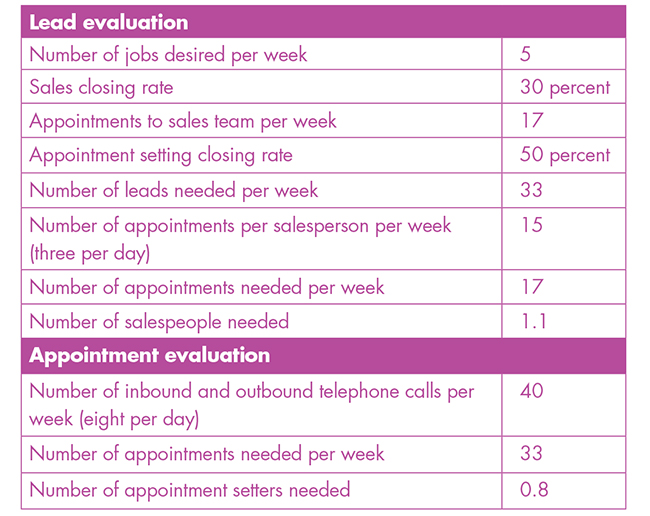Many roofing contractors struggle with how to market their companies and often wonder whether marketing will make a difference. For years, contractors' marketing efforts consisted of Yellow Pages ads along with good salespeople, and for many, it worked. But with current technology, the playing field constantly is changing and traditional marketing no longer will be sufficient.
The roofing industry is seeing savvy contractors using technology and strategic marketing to change the dynamics of roofing sales. To compete with these contractors, you, too, will need to become comfortable with new marketing techniques. You will need to start by reviewing your marketing plan.
Evaluating current efforts
The first step is to evaluate your marketing plan. What is working? Are you tracking responses and leads? Are the leads you are generating turning into sales? What technologies are you using to support your marketing efforts? Are those coupon value packs really bringing in business, or are your ads buried in the midst of your competition?
As part of the evaluation process, you need to understand your market and customers. Now is the time to ask an important question of your customers, such as: "Where did you hear of us?"
By monitoring incoming calls and asking questions, you may realize most of your incoming calls originate from referrals and website inquiries rather than people referencing local ads.
Unfortunately, there still are contractors who have not made the commitment to investing in a website for their companies. In such cases, one has to wonder how many of these contractors are losing potential sales.
The first step for any marketing evaluation program is determining need and following through. This means if you determine your business needs leads and you start getting them, you need to have a plan for what you are going to do with them and how you will follow up. This may seem strange because it should be obvious all businesses need sales leads. But many contractors believe sales will happen if they can just get leads. Unfortunately, it does not always work that way because a company's overall reputation can be damaged along with sales revenue by not adequately handling leads.
Evaluating your teams
As part of the evaluation stage, you need to look at your sales team. How many leads can the team handle per week? How much production is possible while still providing the type of service you believe in and that fits your core values and business model? Many times, there may be just one salesperson working on leads in addition to the owner. So realistically, how many leads can or should your team run per week?
It also is important to look at who is answering the telephone. Is this a person trained in customer service? Does he or she know how to qualify customers while also making sure important information is gathered for the sales team? And is he or she asking how the customer heard about the company? These types of questions and qualifications can make it easier for your sales team and really help the marketing effort.
When evaluating the sales team and telephone strategy, it is obvious not every telephone call turns into a sales call. Your leadership team needs to review current lead processes and determine an ideal number of incoming leads by understanding current close rates. Once you know your company's lead closing rate, it is easier to figure out the required number of leads that should be coming into the front desk. The sales team's closing rate then should be evaluated, and by combining the two, you will better understand what your lead-generation numbers should be or whether there is a need for improved conversion of leads.
Evaluating leads
When determining the number of leads needed, it is a good idea to start at the end. As you bring your leadership team together, it should be understood marketing goals are driven by company goals. How many jobs do you want to complete in a year at what level of profit? Once you know this, you can work backward to effectively determine the level of marketing required. A fundamental lead calculator is shown in the figure.

Lead calculator |
The numbers in the lead calculator need to be generated from research performed by your leadership team, which should be composed of sales, production, finance and marketing staff. However you structure your company, bring your leaders together to review your company's mission, goals and core values. These items are key to building a successful sales and marketing program.
The numbers will become clear as objectives and goals are set. As you are evaluating the number of leads needed to meet goals, it is critical to evaluate the type of leads that will help meet profit goals. Once again, it is about talking to your team. If you are receiving residential leads and you are a commercial roofing contractor, something is off with your marketing strategy. If you are a high-end roofing contractor specializing in slate, tile and synthetics but the leads you are receiving are more interested in asphalt shingles, there is a disconnect.
Know your audience
The idea of targeting your marketing efforts to the right audience once again comes back to knowing what your company is good at and where you can make the most money and then communicating those strengths to your entire team. If your leadership team agrees to the type of customers you need to meet your goals, everyone will work to that end. If not, the leads you receive will continue to be disappointing.
Once goals are set for the company, it is time to set them for the marketing team. You now know what kind of leads and how many of those leads you need each week. So what is the best way to get those leads? This is where a good marketing team comes into play. Targeting and using the correct marketing media is critical. It is important your marketing team understands your market and the profile of the ideal customer needed for sales conversion.
Strong processes
When the right type and number of leads are rolling in, your team needs to have a strong lead process in place. It is critical to know where the leads are coming from and, with some honest discussion, determine how they will be handled. During these discussions, your leadership team may determine you need additional sales representatives or the marketing program needs some revamping to reach the right customers.
Part of evaluating marketing efforts is evaluating your company's strengths and the types of jobs that are profitable and rewarding, and doing so will help generate additional referrals. This and a strong commitment to the evaluation process will lead to good customer relations, overall satisfaction and a reputation that will continue to support the growth of your business.
Every company is different. It is essential companies commit time to their marketing strategies and evaluations every year with check-ins every quarter. The participation of all employees and especially a strong leadership team will help set overall strategy and commitment to goals. The ongoing execution of this process can mean the difference between a successful or unsuccessful marketing plan and subsequent sales and profitability.
Heidi J. Ellsworth is owner of HJE Consulting Group, Camp Sherman, Ore.



